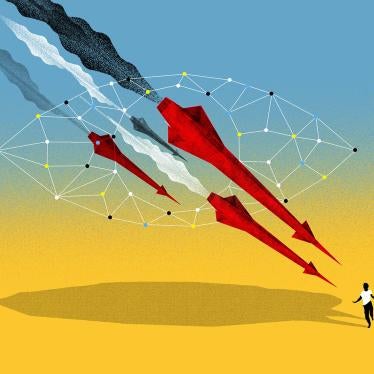(New York) - The report by a panel of experts to United Nations Secretary-General Ban Ki-moon on April 12, 2011, about laws-of-war violations in Sri Lanka should be used to pave the way for justice, Human Rights Watch said today. Ban commissioned the report in May 2010 after the Sri Lankan government failed to investigate violations committed in the final months of its decades-long conflict with the separatist Liberation Tigers of Tamil Eelam (LTTE).
Ban's office said today that he will make the report public after he shares it with the Sri Lankan government. "Secretary-General Ban's creation of a panel of experts and his decision to make the report public show that the UN has not forgotten Sri Lanka's war victims," said Brad Adams, Asia director at Human Rights Watch. "In the face of two years of stonewalling by the government, the public release of this report will help move justice forward in Sri Lanka."
Serious abuses by both government and LTTE forces, which may have amounted to war crimes and crimes against humanity, escalated in the last five months of the war, during which tens of thousands of civilians were killed and injured. On May 23, 2009, shortly after the end of the war, President Mahinda Rajapaksa endorsed a statement promising Ban that the government would investigate alleged laws-of-war violations.
Almost two years later, however, the government has taken no steps to hold anyone on either side of the conflict accountable for serious violations of international law, including war crimes and crimes against humanity. Two ad hoc bodies established by the government after the conflict have failed to lead to any criminal investigations, let alone prosecutions, Human Rights Watch said.
The government opposed Ban's appointment of the panel, calling it an "unwarranted and unnecessary interference with a sovereign nation." Shortly after the panel was appointed, a government minister staged a disruptive demonstration outside the UN headquarters in Sri Lanka's capital, Colombo, which eventually led the UN to recall its resident coordinator temporarily and to close one of its offices. The government has refused to cooperate with the panel or to allow its members to visit Sri Lanka on acceptable conditions, contending that its own domestic mechanisms are capable of ensuring accountability.
However, a committee of experts created by the Sri Lankan government in November 2009 in response to a United States State Department report on wartime abuses never finished its work or published any report.
A second body, the Lessons Learnt and Reconciliation Commission, was only empowered to hold hearings - not to conduct serious investigations. It had no program to protect victims or witnesses who testified before it, and it demonstrated a strong government bias in the conduct of its hearings. Its interim recommendations in September 2010 did not contain a single recommendation related to justice or accountability. It is slated to submit its report to the government in May, but there is no requirement to make the report public, either in full or in part. The government has not released the report of a previous commission set up by Rajapaksa, the 2006 Presidential Commission of Inquiry.
"The government has opposed the panel of experts from the beginning and has done nothing to suggest its position has changed," Adams said. "UN members that care about justice for grave crimes should now make sure that they show all possible support for Ban's efforts."
Sri Lankan officials continue to insist, despite mounting evidence to the contrary, that the Sri Lankan armed forces committed no violations during the conflict's final months. In response to the release of the latest US annual human rights report on April 8, which among other allegations said that extrajudicial killings and enforced disappearances continued to be a problem in Sri Lanka, a military spokesman said that "all these allegations are baseless." Referring to the last months of the war, he continued, "The humanitarian operation was carried out under the law of war and we know that there have been no such acts committed by the armed forces."
On April 7, however, Human Rights Watch released new information about enforced disappearance by the Sri Lanka military during the final days of the war, including video footage of government soldiers interrogating one of the LTTE officers, who later "disappeared." A military spokesman said that all those taken into custody have been accounted for and their relatives notified. But several women have testified before the Lessons Learnt and Reconciliation Commission and filed complaints with the police claiming that the military detained their husbands and that their wives have had no news about them since.
"The lack of a single known criminal investigation of any of the numerous serious war crimes allegations in two years speaks for itself," Adams said. "The government has demonstrated that accountability and justice in Sri Lanka will only come about through international action."






